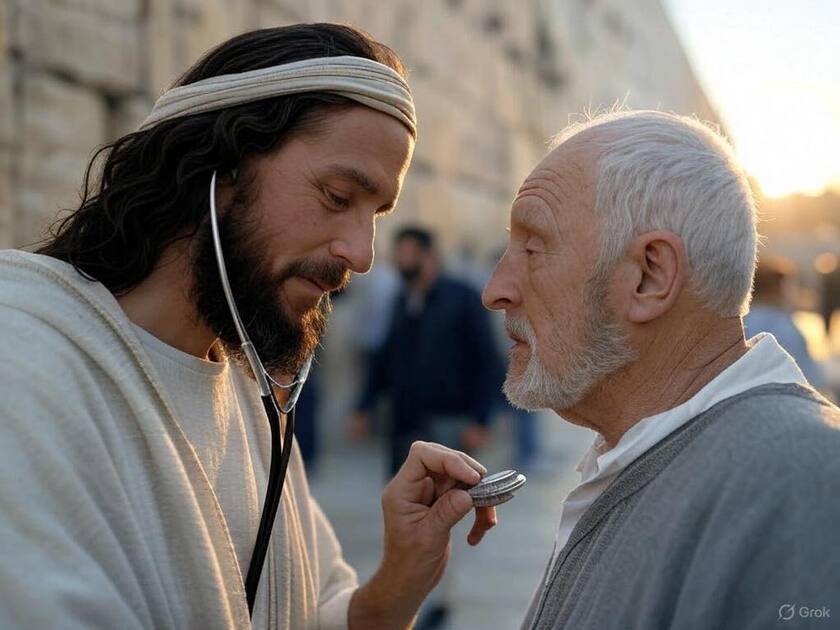It’s Inspection Time
Luke 19:11-12
As they heard these things, he [Jesus] proceeded to tell a parable, because he was near to Jerusalem, and because they supposed that the kingdom of God was to appear immediately. He said therefore, "A nobleman went into a far country to receive for himself a kingdom and then return..."
Before jumping into the conversation Jesus was having about his kingdom to come, let's set the table for this message.
The phrase "as they heard these things" ties this parable to the broader context of what we've studied previously. Jesus had just encountered Zacchaeus in Jerico, a moment of radical grace and transformation. Yet the crowd’s anticipation is now fixated on a more immediate, and visible kingdom. Jesus uses this parable to address the expectations of His listeners. They thought the kingdom of God would manifest fully right then and there, with Jerusalem so close. But Jesus, in His wisdom, shifts their focus through the story of a nobleman who leaves to receive a kingdom and promises to return.
And if we’re truly aiming to learn from God’s wisdom, we can draw a line straight on through to today, April 2, 2025. We’re still in that "in-between" space, still longing for the fullness of the kingdom of Jesus, yet called to act now as his followers in this parable.
But before we read I think it's important to know what's really going on here. It's not just about discipleship and the coming kingdom of God. The nobleman in the parable can be seen as a figure for Christ, who departs (think His ascension) to receive His kingdom fully and will return in glory. But he's not returning to assume His kingdom, he's returning WITH his kingdom.
In that sense, Jesus is the bedrock of the parable’s meaning: His authority and his return anchor the disciples’ purpose. "The church", built on Him as the cornerstone, waits and works in this interim period. So, the lesson isn’t about laying that cornerstone, it assumes that the cornerstone is already in place. Instead, it’s a story about how disciples steward their lives on that cornerstone rock.
That cornerstone imagery is more directly tied to passages like Matthew 21:42 or 1 Peter 2:6-7, where Jesus is identified as the cornerstone rejected by builders yet foundational to God’s plan. But it's at play here as well in that Jesus is about to enter Jerusalem triumphantly. And he's about to be rejected by the religious community there.
Jesus even brings up the stones around Jerusalem to make his case:
Luke 19:39-40
And some of the Pharisees in the crowd said to him, "Teacher, rebuke your disciples." He answered, "I tell you, if these were silent, the very stones would cry out."
Jesus as the bedrock isn’t just a static foundation; he is that cornerstone crying out. But do they hear him? He’s the living cornerstone who holds everything together, even when they rejected Him. The parable assumes His authority is already established; He’s not laying a new stone but building on the one that's already set in stone. The nobleman’s absence tests his servants’ faithfulness. For disciples, then and now, it’s about stewarding life on that unshakable rock while the King is "away."
What is that rock? It's not what, it's who and that who is Jesus Christ, full stop.
Just days away, Jesus will ride into Jerusalem hailed as King, only to be rejected by the religious elite. It’s a lesson on discipleship, yes, it's about living faithfully in the delay, but rooted in Jesus as the cornerstone. The kingdoms not deferred; it’s unfolding through Him, culminating in His return with glory.
Okay, so back to the parable:
Luke 19:13-14
Calling ten of his servants, he gave them ten minas,and said to them, ‘Engage in business until I come.’ But his citizens hated him and sent a delegation after him, saying, ‘We do not want this man to reign over us.’
So what do you suppose is going on here in Jesus' mind?
Jesus seems to be painting a picture of responsibility and stewardship. The nobleman (a stand-in for Christ) doesn’t leave his servants idle; he gives them resources and a mission. "Engage in business" isn’t just about profit, it’s about our actions, initiative, faithfulness with what’s entrusted to us. They had one job, do his business. And apparently some did but others weren't having any of it.
The citizens’ rebel against the nobleman. This is where Jesus’ context sharpens the point. He’s near Jerusalem, days from the Triumphal Entry, and He knows rejection awaits him. He’s weaving in the reality of His own mission: a King sent by God, yet despised by those He came to rule. The delegation mirrors the real opposition He faces, even as He speaks. It’s a sobering nod to human resistance against God’s authority, something Jesus sees clearly and wants His listeners to maybe grasp.
To His disciples, it’s a charge: I’m leaving, but I’m not abandoning you, use what I give you faithfully. To the broader crowd, it’s a warning: reject me if you will, but my kingship isn’t up for a vote. He is the cornerstone and without him the entire temple will come tumbling down. Not one stone will remain upon another without him.
The ten minas represent what He entrusts; His teachings, the gospel, His Spirit, His authority, trusted to them to carry forward in His absence. It’s a practical, urgent call to action, knowing He’s about to ascend. But the citizens’ rejection, "We do not want this man to reign over us", reveals what's at stake.
In Jewish thought, the temple was the heart of God’s presence, built on a foundation stone that symbolized stability. Jesus, as the true cornerstone (Psalm 118:22, Matthew 21:42), is that bedrock. Without Him, the structure, whether it’s the literal temple or the spiritual reality of God’s people, can’t stand. "Not one stone upon another" isn’t just destruction: it’s the inevitable result of building on anything less than Him. And I mean anything or anyone other than Him.
Luke 19:15
When he returned, having received the kingdom, he ordered these servants to whom he had given the money to be called to him, that he might know what they had gained by doing business.
And what did Jesus find? When he returned to Jerusalem, what did he find?
Now, pivot to Luke 19:45-46.
Luke 19:45-46
And he entered the temple and began to drive out those who sold, saying to them, "It is written, ‘My house shall be a house of prayer,’ but you have made it a den of robbers."
Jesus enters Jerusalem, not as the returning king of the parable yet, but as the cornerstone arriving to inspect His house. What does He find? Not faithful servants multiplying what’s His, but a "den of robbers." The temple, meant to be "a house of prayer" (Isaiah 56:7), has been corrupted into a marketplace of exploitation.
What’s Jesus finding here? In the parable, He imagines a return where faithfulness is tested. In the temple, he confronts the present reality: rejection of His purpose is already underway. The citizens who “hated him” (v. 14) aren’t just hypothetical, they’re the ones running the show right in front of Him. He’s not surprised; He knows the cross is coming. But His actions scream that the cornerstone won’t tolerate a counterfeit kingdom. He cleanses the temple as a sign: God’s house rests on Him, not on their schemes.
So why am I doing this? Why am I juxtaposing what's about to come with this parable?
I get the sense that Jesus is doing exactly that. And we have to understand it from his perspective. This isn't just Jesus of Nazareth triumphantly entering into Jerusalem. This is the Creator, the one who created the stones it built from. The one who established this kingdom, the One who called Israel. And he's coming home. This isn't just Jesus of Nazareth the man, this is King of the universe.
And so, it's inspection time. And the inspector is coming. And the people are going to kill him because they've rejected him. The parable bears this out. The people, entrusted with God’s kingdom, fail to recognize or honor the one sent to them, even when he’s the rightful heir and has all authority. Instead, they have their traditions and values based upon their self-righteousness.
In the parable, Luke 19:16-27, there are many excuses made by the people who had been entrusted with the nobleman's wealth. Some fared well and others not so well.
The people’s failure isn’t just mismanagement of resources (like the minas) but a rejection of the one who gave them everything to begin with, Israel, the Law, the promises of the gospel. When he comes back as king, he inspects what they’ve done with what he gave them. Some servants multiply their minas through diligence, while one hides his out of fear, offering excuses about the nobleman’s harshness. This is a picture of the church as we see later on in the Revelation. Meanwhile, there’s a group of citizens who outright reject the nobleman’s authority, refusing to accept him as their king at all, and they meet a very grim fate.
And so here we are. This is the reality of what's been going on since this telling of the parable. Two thousand plus years later and it's still going on.
Luke 19:47-48
And he was teaching daily in the temple. The chief priests and the scribes and the principal men of the people were seeking to destroy him, but they did not find anything they could do, for all the people were hanging on his words.
We're drawing a straight line from the events of Luke 19 to today, and it’s a compelling reflection. In Luke 19:47-48, we see Jesus teaching in the temple, right in the heart of Jerusalem, the epicenter of religious and cultural life, while the chief priests, scribes, and leading men are plotting to kill him. Yet, they’re stuck because the crowd is captivated by his words. It’s a tense standoff, the authority of Jesus’ presence and teaching clashing with the entrenched power of the religious elite, who feel threatened by him.
For a couple thousand years now wars have been fought, won and lost over this tension. Nations have risen and fallen over this tension. It's all just a bunch of stinking thinking. It's worldly thinking about Christ's kingdom.
The rejection by the religious leaders, the crowds torn between awe and confusion, it all points to a fundamental misunderstanding. People expect a kingdom of power, conquest, and control, like the nobleman’s enemies might have feared or the chief priests might have wanted to protect against. But Jesus rides in on a donkey, teaches in the temple, and heads to a cross. His kingdom doesn’t play by the world’s rules, and that’s been tripping humanity up for two thousand years.
Nations fight over land, ideology, or dominance, thinking that’s what a kingdom looks like. Even religious wars: crusades, conflicts, schisms, often stemming from this same "stinking thinking," twisting Christ’s message into something territorial. We see it today with theological battles over who has "the truth", the "one true church".
It's like modern echoes of the chief priests and scribes scrambling to protect their own turf. It’s that same worldly thinking sneaking in, turning Christ’s kingdom into a prize to be won, a title to claim, or a fortress to defend.
These fights often boil down to control: my doctrine’s purer, my tradition’s older, my interpretation’s the only one that counts. It’s less about hanging on Jesus’ words, like the crowd in Luke 19:48, and more about building walls around each other.
When Jesus tells the parable of the nobleman in Luke 19:11-27, He’s standing at a pivotal moment. He’s just shown radical grace to Zacchaeus, a tax collector despised by the crowd, and now He’s nearing Jerusalem, the city where He’ll be hailed as King and then crucified within days. The crowd’s buzzing with expectation, thinking the kingdom of God is about to drop like a political revolution. But He’s still the cornerstone, and the call hasn’t changed: engage in His business, live faithfully, trust the King who’s coming back.
What’s on Jesus’ mind in Luke 19? I think it’s us. His disciples then and now. He's urging us to build on Him, not on ourselves, because He’s already seen the end of the story. He's laid out what he values most in us, and it's all right there in the parable. The trick now is to not get caught up in the stupidness that's about to go down in Jerusalem.
He’s telling us to stop fighting over the building plans and start living like the structures already secure. In His mind, it’s inspection time every day until He returns, and He’s asking:
"What’d you do with what I gave you?"
Amen.




















